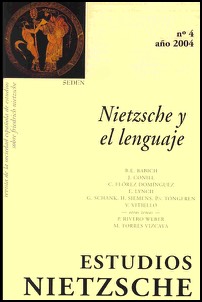La ausencia presente de Nietzsche en Ser y tiempo. Proximidad entre el concepto nietzscheano ‘interpretación’ y el heideggeriano ‘comprensión’
DOI:
https://doi.org/10.24310/EstudiosNIETen.vi4.9148Abstract
Estableciendo como hilo conductor el concepto de interpretación (Auslegung) en Nietzsche y comprensión (Verstehen) en Heidegger, se pretende concluir que el concepto nietzscheano interpretación anticipa el heideggeriano comprensión. A una con ello se señala que la obra de 1927 repite y prolonga la crítica al logos iniciada por Nietzsche y que ello se manifiesta característicamente en la vinculación entre ambos conceptos. Se convierte así en tarea urgente la reconstrucción de la ausencia de Nietzsche en Ser y tiempo.
Downloads
Metrics
References
Deleuze, G., Nietzsche y la filosofía, tr. Carmen Artal, Anagrama, Barcelona, 31993.
Figl, J., Interpretation als philosophisches Prinzip, W. De Gruyter, Berlin, 1982.
Gadamer, H.G., Verdad y método II, tr. M. Olasagasti, Sígueme, Salamanca, 21994.
Grondin, J., Introducción a la hermenéutica filosófica, trad. Angela Ackermann, Herder, Barcelona, 1999.
Heidegger, M., Gesamtausgabe, vol. 2: Sein und Zeit (= SuZ), V. Klostermann, Frankfurt am Main, 1977.
Heidegger, M., Nietzsche, Neske, Pfullingen, 2 vols., 1961, vol. I.
Müller-Lauter, W., «Nietzsches Lehre vom Willen zur Macht», Nietzsche Studien, 3, 1974 , p. 49 y, en general, 41-60.
Nietzsche, F., Fragmentos Póstumos I-IV (FP). Director ed. Diego Sánchez Meca. Madrid: Tecnos, 2006-2010.
Nietzsche, F., Obras Completas, I-IV (OC ). Director ed. Diego Sánchez Meca. Madrid: Tecnos, 2011-2016
Pöggeler, O., El camino del pensar de M. Heidegger, tr. Félix Duque, Alianza, Madrid, 1986.
Rodríguez, R., La transformación hermenéutica de la fenomenología, Tecnos, Madrid,1997.
Vattimo, G., Introducción a Nietzsche, tr. J. Binaghi, Paidós, Barcelona, 1990.
Vermal, J. L., La crítica de la metafísica en Nietzsche, Anthropos, Barcelona.
Downloads
Published
How to Cite
Issue
Section
License
As of issue 21 (2021) this journal is published only in open access (diamond route).
From that number 21, like the previous numbers published in NIETZSCHE STUDIES, they are subject to the Creative Commons Acknowledgment-NoComercia-ShareIgual 4.0 license, the full text of which can be consulted at <http://creativecommons.org/licenses/by-nc-sa/4.0 >
It is the responsibility of the authors to obtain the necessary permissions of the images that are subject to copyright.
This work is licensed under a Creative Commons Attribution-NonCommercial-ShareAlike 4.0 International License.
Copyright generates two different rights: moral rights and patrimonial rights that EJFB recognizes and respects. Moral rights are those relating to the recognition of the authorship. They are rights of a personal nature that are perpetual, inalienable, unseizable and imprescriptible as consequence of the indivisible union of the author and his/her work.
Patrimonial rights are those that can be derived from the reproduction, distribution, adaptation or communication of the work, among others.







11.png)
